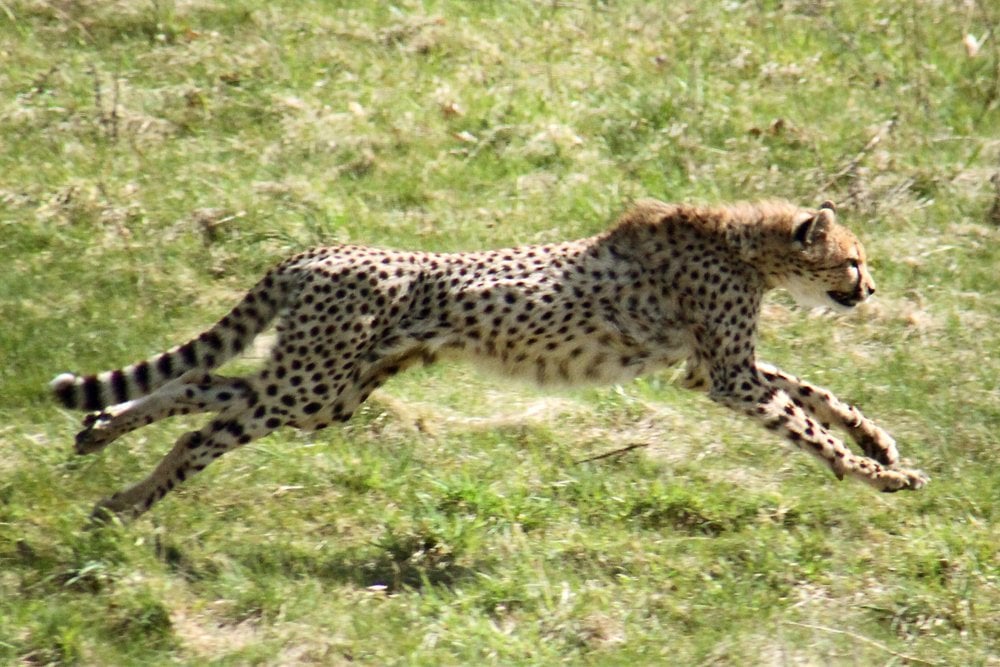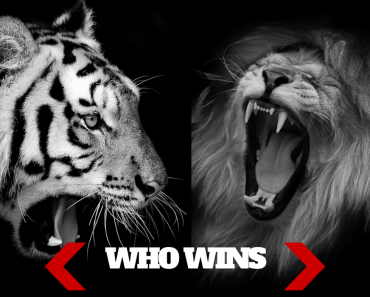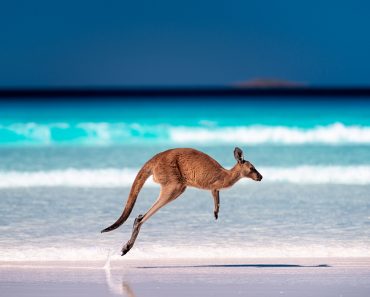Table of Contents (click to expand)
Humans can’t run as fast as cheetahs because cheetahs have more fast twitch muscle fibers, which allows them to run in short bursts at high speeds. Humans have more slow twitch muscle fibers, which allows them to run for long periods of time, but not as fast as cheetahs.
It is common knowledge that the cheetah is the fastest land animal on Earth. Achieving top speeds of approximately 70 mph or 112 kmph, these magnificent creatures can outrun Usain Bolt any day. In 2009 Usain Bolt set a new record, thus making the highest measured speed of a human an astonishing 27.8 mph or 44.72 kmph. While those numbers may sound big, they are pretty whimsical when compared to that of cheetahs.
Recommended Video for you:
How Do Cheetahs Run So Fast?
It is said that if humans were in a race with 50 of the fastest land animals on the planet, we would secure the 28th position. Obviously, the cheetah would take the first prize. In fact, the cheetah holds the record for the fastest land animal since the last ten million years. There are certain factors which enable it to run so fast. A cheetah’s body is light and therefore the legs don’t waste much energy on carrying weight. This saved energy can be used for acceleration instead. Cheetahs also have a flattened rib cage, and their head is small. This helps to reduce the air resistance.
During each stride, the paws of the cheetah spend more time in air than on the ground itself. Cheetahs are the only members of the cat family whose claws are not completely retractable, thus giving them a better grip. Their tail acts as a rudder to stabilize the animal while running.
They also have a very flexible spine, and the shoulder blades are not attached to the collar bone. This enables them to extend their legs and stretch their body more, thus covering more distance per stride. While running, a cheetah’s feet touch the ground one at a time, instead of all together or in pairs.

Why Can’t Humans Run Faster Than Cheetahs?
As mentioned above, humans are no match for a cheetah. We have a number of factors which prevent us from running so fast. Since we have evolved from apes, our hands and feet are larger. While this gives us better balance, we compromise in terms of speed. Humans are bulkier, due to which more of the energy we generate goes in carrying our weight. Our heads are also bigger in proportion to our body, as compared to that of the cheetah. Another factor which affects our speed is that our ankles only allow our feet to move forward, and not backward. This reduces our speed.
One major factor which affects our speed are the muscles. Humans have 3 types of muscles – slow twitch, fast twitch and super-fast twitch. Fast twitch muscles provide speed and burn up more quickly, while super-fast twitch muscles provide even more speed. In contrast, slow twitch muscles burn slowly and are better for endurance, as compared to speed. Humans have roughly 50% slow twitch and 50% fast twitch muscles, with less than 2% super-fast twitch muscles. Cheetahs, on the other hand, have almost 70% fast twitch muscles. This, therefore explains why cheetahs are so fast and humans are much slower in comparison.

Endurance And Speed
While humans may not fare very well in an all animals race, we are not a lost cause. The key, again, lies in our muscles.
We have already established the mind blowing speed of cheetahs. They can accelerate from 0-60 mph in a matter of three seconds. However, while cheetahs can run extremely fast, they can do so in short bursts. They tire out soon, and therefore are not involved in long chases.
Since they have a larger amount of fast twitch muscles, they can accelerate very quickly, but cannot maintain the speed for very long. Humans, on the other hand, can run for longer due to the amount of our slow twitch muscles. In fact, it is theorized that if all the animals were to run an ultramarathon, of 200 km or more, humans would probably stand a fighting chance. While the cheetah may be able to run extremely fast in short bursts, humans will be able to run for longer. Sort of like the hare and the tortoise tale. In fact, there is an annual Man vs Horse marathon in which humans and horses have been playing the tug of war for the first spot since 1980. This proves that humans are great at distance running.
Scientists believe that our endurance running may be a result of evolution. It is known that our ancestors would often catch their prey by chasing and tiring them out.
Can You Become Faster?
The exact ratio of slow twitch to fast twitch muscles are not fixed. They differ from person to person. This ratio determines the speed of a person. Unfortunately, this ratio cannot be altered to a great extent. Obviously, regular training and exercise can help in building and activating our muscles, but it cannot affect the amount of fast twitch muscles to a large extent.
Studies have shown that fast sprinters have a larger amount of fast twitch muscles, while those who can run for longer amounts of time have more amount of slow twitch muscles.
While it may be impossible to de-throne the cheetah as the fastest land animal, we can take solace in the fact that we can run for longer. Maybe not first prize, but we can get the consolation prize!
References (click to expand)
- Smithsonian Channel (2012). This Is Why You Can't Outrun a Cheetah | Smithsonian Channel. Youtube
- CE Buckley. Speed is Relative (Human and Animal Running Speeds). Illinois State University
- Running paced human evolution - Harvard Gazette. Harvard University
- How Much Faster Can We Run? - Scienceline. scienceline.org












